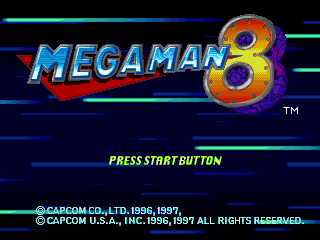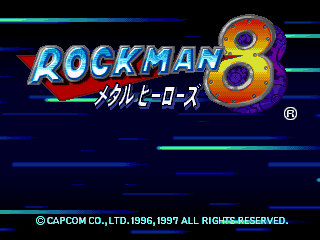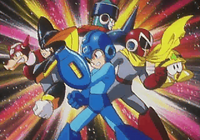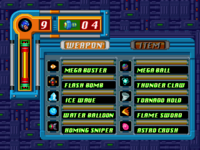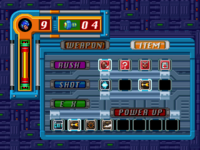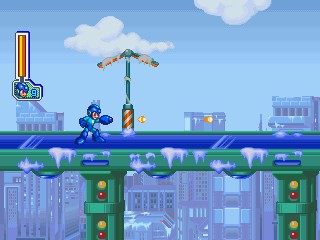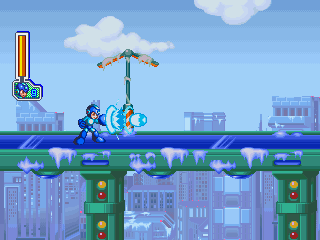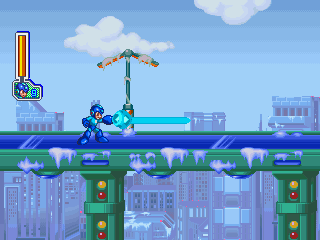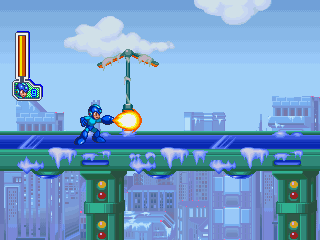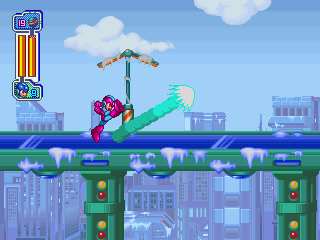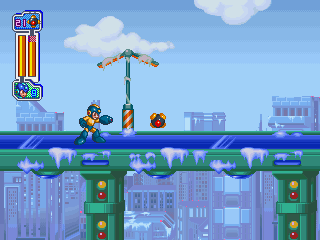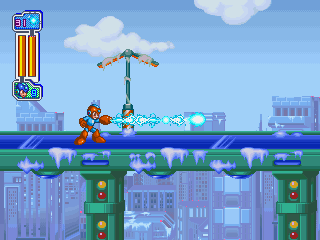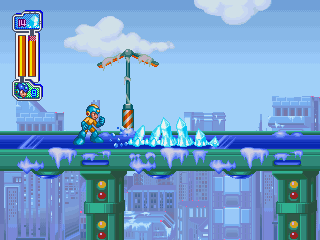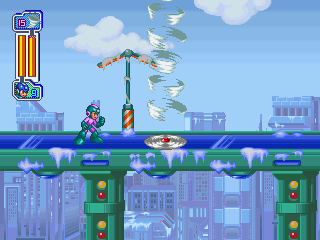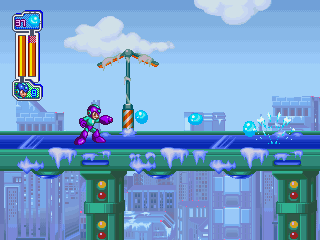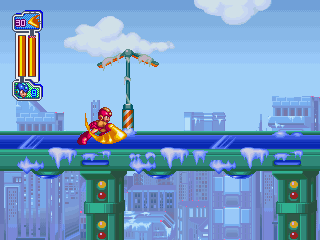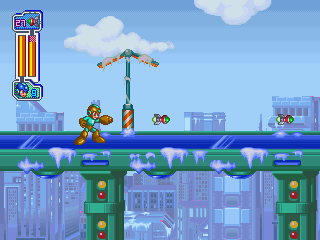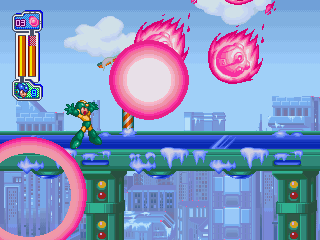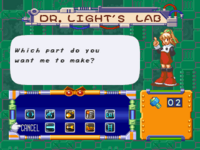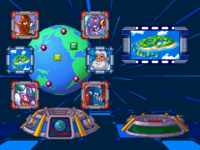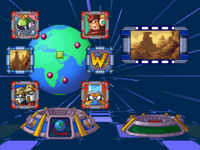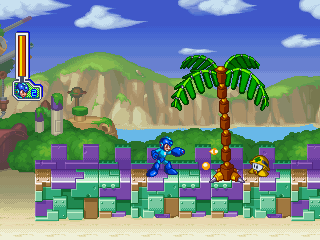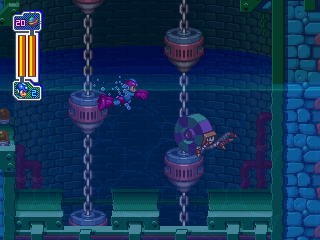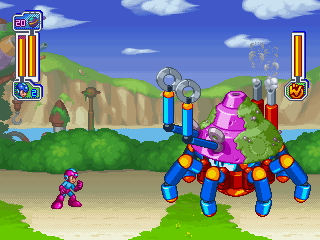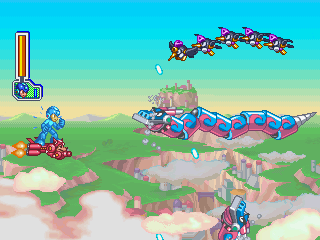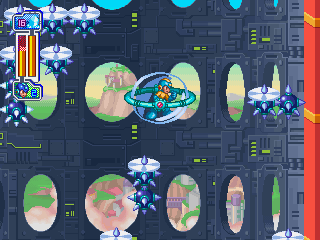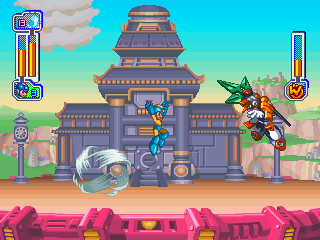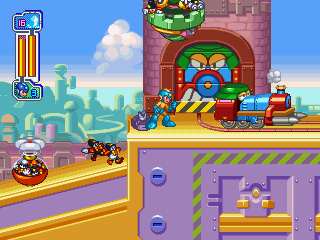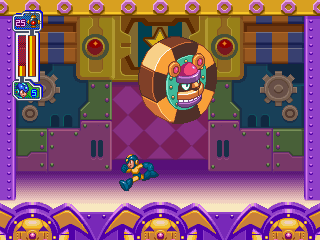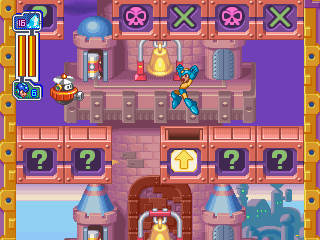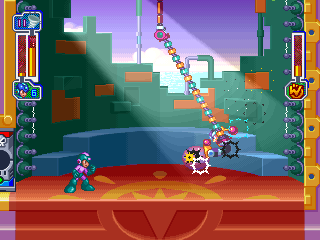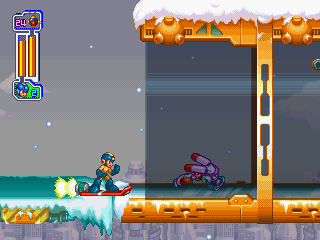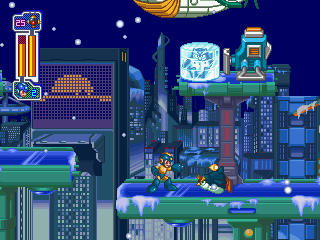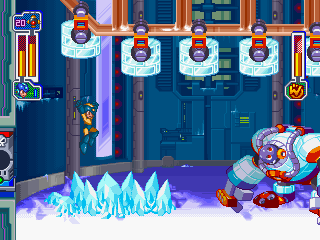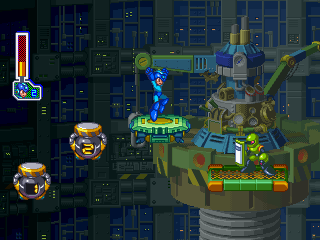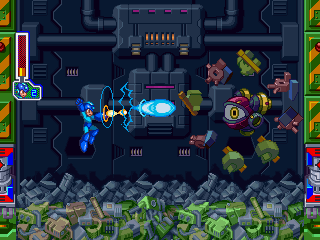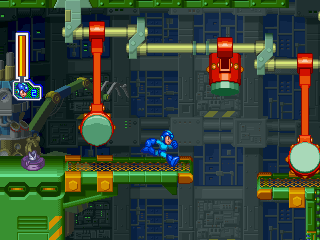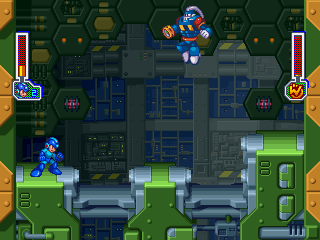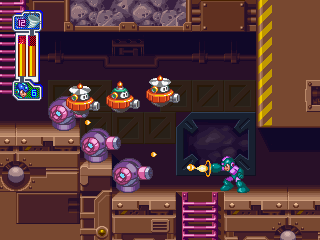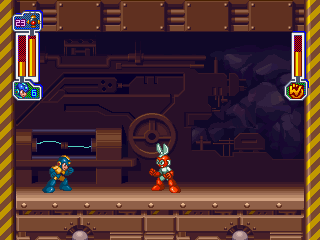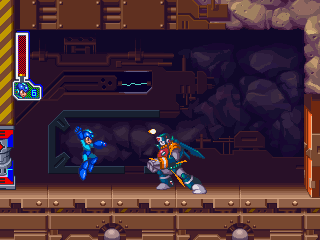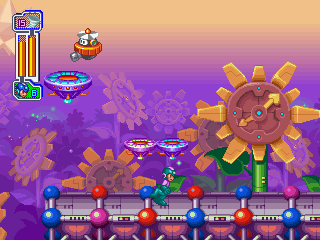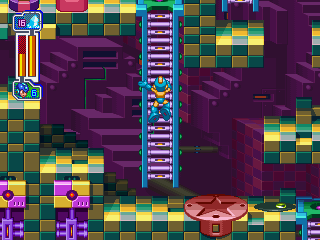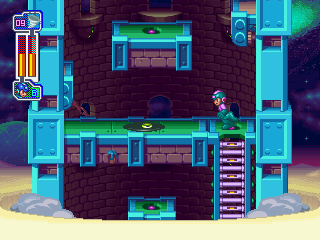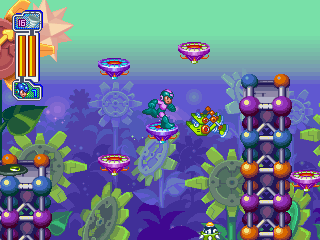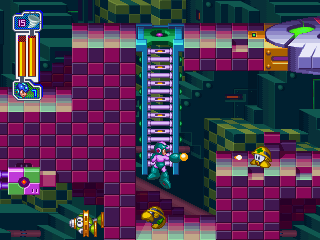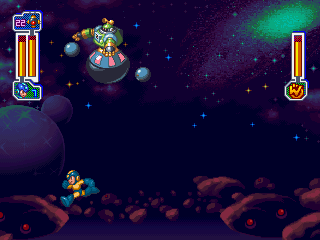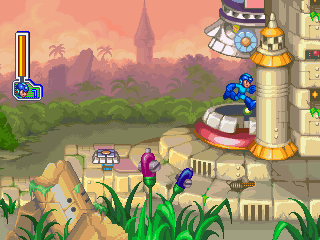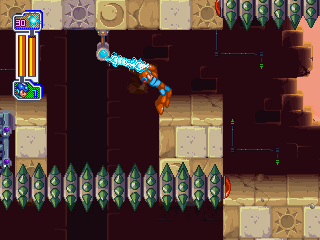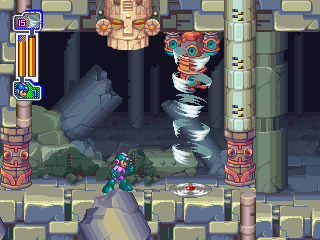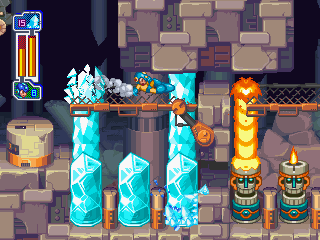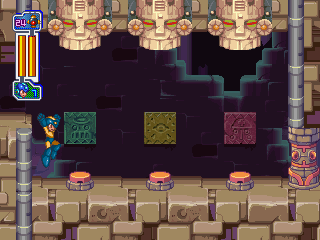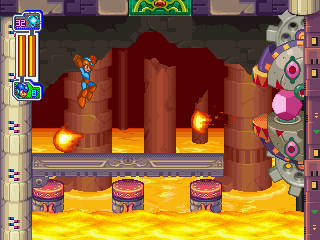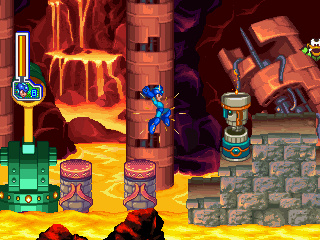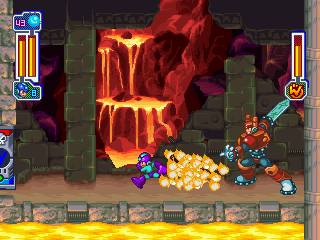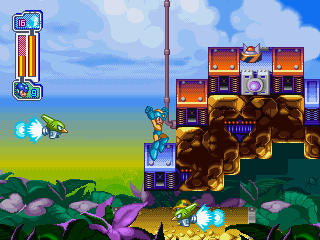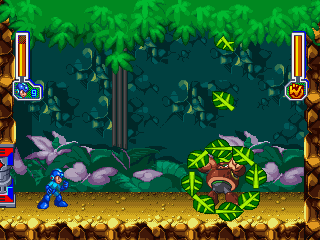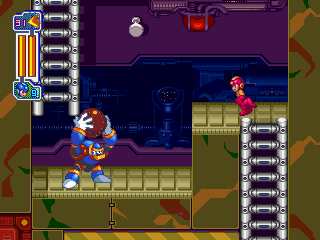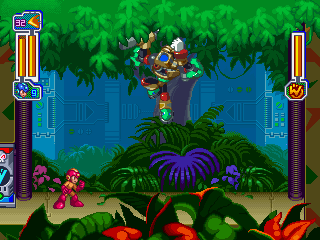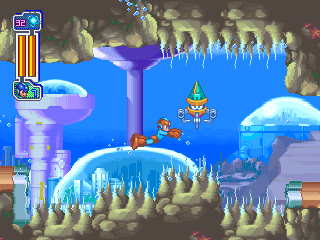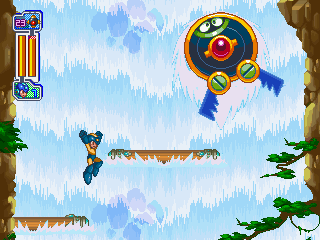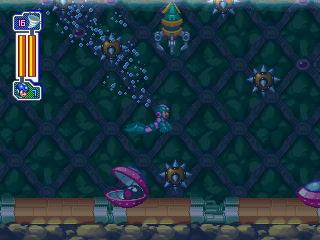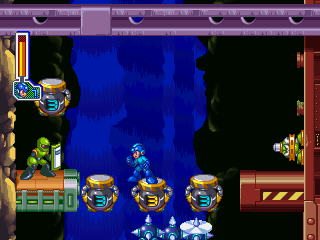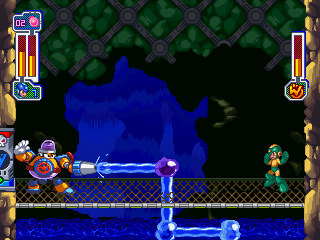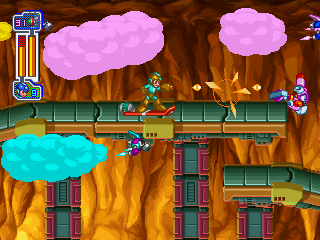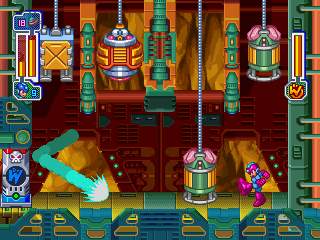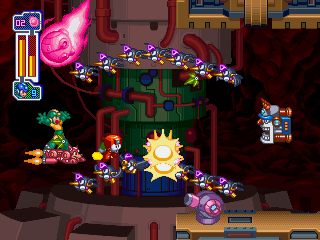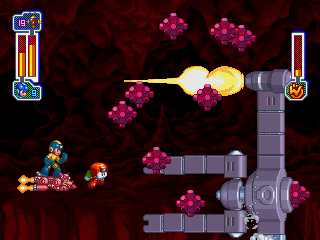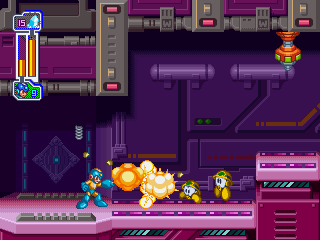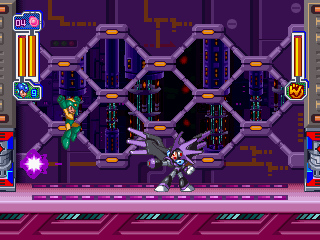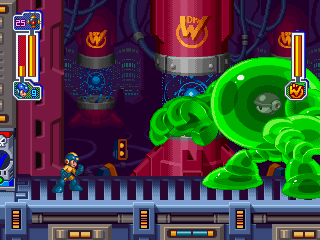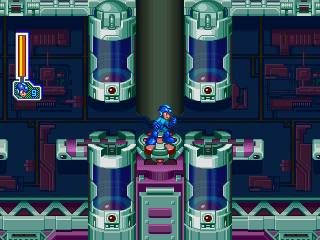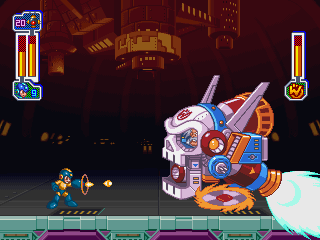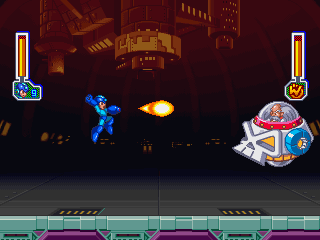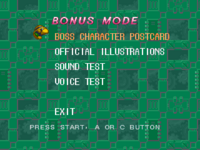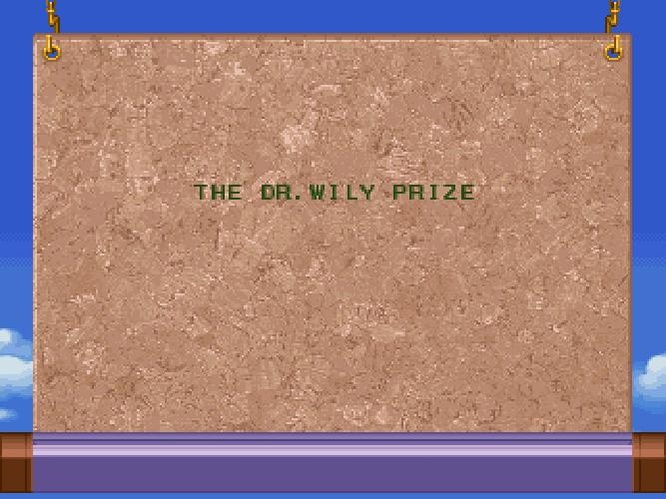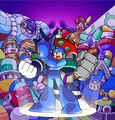Mega Man 8
From Sega Retro
| ||||||||||||||||||||
| Mega Man 8 | ||||||||||||||||||||
|---|---|---|---|---|---|---|---|---|---|---|---|---|---|---|---|---|---|---|---|---|
| System(s): Sega Saturn | ||||||||||||||||||||
| Publisher: Capcom | ||||||||||||||||||||
| Developer: Capcom | ||||||||||||||||||||
| Supporting companies: Xebec (animation) | ||||||||||||||||||||
| Licensor: GANASIA, Victor Entertainment (theme song) | ||||||||||||||||||||
| Genre: Action[1][2] | ||||||||||||||||||||
| Number of players: 1 | ||||||||||||||||||||
| ||||||||||||||||||||
|
Mega Man 8, known in Japan as Rockman 8: Metal Heroes (ロックマン8 メタルヒーローズ), is a Sega Saturn action platform game developed and published by Capcom. An expanded port of the titular December 1996 Sony PlayStation release Mega Man 8, it was first released in Japan in January 1997[2], and was later localized and brought to the United States the following March.[4] Mega Man 8 is the first and only mainline Mega Man game to appear on a Sega console (excluding the 1994 compilation The Wily Wars).
The American release is titled Mega Man 8: Anniversary Collector's Edition due to its release coinciding with the ten-year anniversary of the Western debut of Mega Man for the NES.
Contents
Story
In the year "20XX," the world has recovered from Dr. Wily's seventh attempt to take over the world. Up in space, however, a battle between two mysterious robots nears its climactic finish, causing one of them to careen through the solar system and toward a familiar blue planet.
Meanwhile, Mega Man and Bass are doing battle over the city on their respective mechanical canine companions, Rush and Treble, much to the disappointment of Mega Man. When Roll arrives on the scene, Mega Man manages to get away as Bass gets his Buster tangled in an elevator cable. He vows to battle Mega Man one more time. Aboard Roll's hover car, Dr. Light informs Mega Man of a strange energy reading coming from a skull-shaped island located in the Pacific Ocean that used to be one of Dr. Wily's many bases. The game begins with Mega Man arriving on the island in search of the energy signal.
The story is told through full-motion video and in-game cutscenes.
Gameplay
The game is an action platformer similar to its predecessors. Mega Man moves with ![]() and
and ![]() . He jumps with
. He jumps with ![]() and jumps higher the longer the button is held. He cannot duck but can perform a ground slide with
and jumps higher the longer the button is held. He cannot duck but can perform a ground slide with ![]() +
+![]() . He can swim while underwater with
. He can swim while underwater with ![]()
![]()
![]()
![]()
![]() . Mega Man is equipped with an arm-mounted Mega Buster, which has unlimited ammunition and can be fired with
. Mega Man is equipped with an arm-mounted Mega Buster, which has unlimited ammunition and can be fired with ![]() . The Mega Buster can charge a more powerful shot by holding
. The Mega Buster can charge a more powerful shot by holding ![]() and releasing it when Mega Man starts to glow. Mega Man acquires an assortment of special weapons throughout the game, which cost energy to use and can be fired with
and releasing it when Mega Man starts to glow. Mega Man acquires an assortment of special weapons throughout the game, which cost energy to use and can be fired with ![]() . Special weapons each have their own energy supply. Unlike previous games, Mega Man can continue to fire the Mega Buster when he has a special weapon equipped. The player can switch the special weapon with
. Special weapons each have their own energy supply. Unlike previous games, Mega Man can continue to fire the Mega Buster when he has a special weapon equipped. The player can switch the special weapon with ![]() and
and ![]() or through the pause menu with START .
or through the pause menu with START .
Most stages have a Robot Master that must be defeated, which awards Mega Man with the Robot Master's weapon. Most Robot Masters are weak to either the Mega Buster or one or more special weapons, allowing for some strategy in the order the stages are completed. After defeating all of the Robot Masters, Mega Man travels to the Wily Tower to face Dr. Wily.
Mega Man can collect Bolts, which are hidden throughout most of the stages. These Bolts can be used to buy parts in Dr. Light's Lab, which enhance Mega Man's abilities or provide convenience features. There are a total of 40 Bolts in the game, which is not enough to buy all of the parts, so the player must decide which parts to prioritize. The player can replay previously completed stages to collect Bolts.
Some stages have special shoot-'em-up sections where Mega Man flies through the air on top of his robot dog Rush. In these sections, Rush moves in any direction using the D-Pad, and Mega Man retains use of his weapons.
Mega Man's health is indicated by a gauge in the corner of the screen. He loses health when he takes damage from an enemy. Some obstacles, such as spikes or bottomless pits, destroy Mega Man regardless of how much health he has remaining. If he loses all of his health, he loses a life. Stages are divided into multiple areas, and Mega Man revives at the beginning of the current area with full health and special weapon energy after losing life.
The game saves the player's progress to the Saturn's internal memory or a backup cartridge.
Weapons
Items
Platforming
| Small Weapon Capsule | |
|---|---|
| Restores a small amount of energy for the currently selected weapon. | |
| Medium Weapon Capsule | |
| Restores a medium amount of energy for the currently selected weapon. | |
| Large Weapon Capsule | |
| Restores a large amount of energy for the currently selected weapon. | |
| Small Energy Pellet | |
| Restores a small amount of health to Mega Man. | |
| Large Energy Pellet | |
| Restores a large amount of health to Mega Man. | |
| 1-Up | |
| Gives the player an extra life. | |
| Bolt | |
| Bolts are hidden throughout the stages and can be exchanged for parts in Dr. Light's Lab. There are 40 Bolts total in the game. |
Flying
These items are found in the shoot-'em-up sections where Mega Man rides Rush.
| Rush | |
|---|---|
| Arms Rush with a cannon that fires when Mega Man fires. | |
| Beat | |
| Summons Beat to follow Mega Man and Rush. Beat destroys enemies that he touches and charges at enemies when Mega Man does a charged shot. | |
| Eddie | |
| Summons Eddie to follow Mega Man and Rush. Eddie drops bombs in an arc when Mega Man attacks. | |
| Auto | |
| Summons Auto to follow Mega Man and Rush. Auto launches missiles at enemies. |
Parts
Mega Man can exchange Bolts with Roll for parts in Dr. Light's Lab (with the exception of the Rush items, which are acquired by defeating minibosses). The player can use or equip parts through the in-game pause menu, accessed with START .
The Rush items can each be used once per stage.
| Rush Bike | |
|---|---|
| Summons Rush, who transforms into a motorbike that Mega Man can ride. Acquired by defeating Grenade Man's miniboss. | |
| Rush Charger | |
| Summons Rush, who drops a random power-up item. Acquired by defeating Clown Man's miniboss. | |
| Rush Bomber | |
| Summons Rush, who flies overhead and drops bombs on enemies. Acquired by defeating Sword Man's miniboss. | |
| Rush Health | |
| Summons Rush, who flies overhead and drops items for restoring health and weapon energy. Acquired by defeating Aqua Man's miniboss. | |
| Power Shield | |
| Gives Mega Man a shield that prevents him from being knocked back when he is hit, which can be useful for some of the more precarious platforming areas. Costs 6 Bolts. | |
| Spare Extra | |
| Starts the player with 4 lives instead of 3 when continuing or with 4 lives instead of 2 when using the Spare Charger. Costs 6 Bolts. | |
| Shooting Part | |
| Allows the Mega Buster to have up to 5 shots on screen at a time instead of 3. Costs 6 Bolts. | |
| Energy Balancer | |
| Automatically refills the weapon with the least amount of energy when Mega Man collects a weapon recharge capsule. Costs 5 Bolts. | |
| Exit | |
| Allows the player to exit a stage anytime if it has already been completed before, which is useful for replaying stages when collecting Bolts. Costs 4 Bolts. | |
| Laser Shot | |
| Replaces the Mega Buster's Charged Shot with a penetrating laser shot. Costs 5 Bolts. | |
| Arrow Shot | |
| Replaces the Mega Buster's Charged Shot with a fireball that breaks into a spreadshot after hitting an enemy. Costs 5 Bolts. | |
| Auto Shoot | |
| Replaces the Mega Buster's Charged Shot with a rapid-fire attack. Costs 5 Bolts. | |
| Step Booster | |
| Allows Mega Man to climb ladders faster. Costs 5 Bolts. | |
| Energy Saver | |
| Reduces the amount of energy needed by each weapon. Costs 6 Bolts. | |
| Super Recover | |
| Increases the amount of health that Mega Man gets from energy pellets. Costs 5 Bolts. | |
| Spare Charger | |
| Restores Mega Man with 2 lives (or 4 lives with the Spare Extra) if he finishes a stage with less than that. Costs 4 Bolts. | |
| Hyper Slider | |
| Increases the speed of Mega Man's ground slide. Costs 5 Bolts. | |
| High-Speed Charge | |
| Reduces the amount of time to charge the Mega Buster. Costs 7 Bolts. | |
| Rapid Part | |
| Fires 3 shots from the Mega Buster simultaneously when fired. Costs 6 Bolts. | |
| Boost Part | |
| Increases the speed of the Mega Buster's projectiles. Costs 5 Bolts. | |
| Exchanger | |
| Refills weapon energy instead of life when an energy pellet is collected if Mega Man is already at full life. Costs 4 Bolts. |
Stages
The game begins with an opening stage. After it is completed, the player can choose to face Tengu Man, Clown Man, Frost Man, or Grenade Man in any order.
Once the initial four Robot Masters have been defeated, the player plays a middle stage with Duo as the boss. After it is completed, the player can choose to face Astro Man, Sword Man, Search Man, or Aqua Man in any order.
After all of the Robot Masters have been defeated, Mega Man travels to the Wily Tower and plays the final four stages in order.
The player can replay any previously completed stage, which can be helpful for collecting Bolts. The Wily Tower stages must all be completed in sequence and cannot be selected individually. The player can also access Dr. Light's Lab from the stage select screen, which can be used to save the game, change options, or buy parts.
| Opening | |
|---|---|
| Mega Man acquires the Mega Ball weapon from Dr. Light in this stage. The boss is Yadokargo. | |
| Tengu Man | |
| Tengu Man's weakness is the Ice Wave weapon. Mega Man receives the Tornado Hold weapon after defeating him. | |
| Clown Man | |
| Clown Man's weakness is the Tornado Hold weapon. Mega Man receives the Thunder Claw weapon after defeating him. The miniboss drops the Rush Charger item. | |
| Frost Man | |
| Frost Man's weakness is the Flash Bomb weapon. Mega Man receives the Ice Wave weapon after defeating him. | |
| Grenade Man | |
| Grenade Man's weakness is the Thunder Claw weapon. Mega Man receives the Flash Bomb weapon after defeating him. The miniboss drops the Rush Bike item. | |
| Duo | |
| Mega Man can find Cut Man (from Mega Man) in this stage. He drops a Bolt when he is defeated. His weakness is the Thunder Claw weapon. Duo has no particular weakness besides the Mega Buster. | |
| Astro Man | |
| Astro Man's weakness is the Homing Sniper weapon. Mega Man receives the Astro Crush weapon after defeating him. | |
| Sword Man | |
| Sword Man's weakness is the Water Balloon weapon. Mega Man receives the Flame Sword weapon after defeating him. The miniboss drops the Rush Bomber item. | |
| Search Man | |
| Mega Man encounters Wood Man (from Mega Man 2) in this stage. He drops a Bolt when he is defeated. His weakness is the Flame Sword weapon. Search Man's weakness is the Flame Sword weapon. Mega Man receives the Homing Sniper weapon after defeating him. | |
| Aqua Man | |
| Aqua Man's weakness is the Astro Crush weapon. Mega Man receives the Water Balloon weapon after defeating him. The miniboss drops the Rush Health item. | |
| Wily Tower 1 | |
| The boss is Atetemino, whose weakness is the Mega Ball. | |
| Wily Tower 2 | |
| The boss is Bliking, whose weakness is the Astro Crush. | |
| Wily Tower 3 | |
| The bosses are Bass, whose weakness is the Astro Crush, and the Green Devil, whose weaknesses are the Mega Buster with the Laser Shot, the Flash Bomb, and the Thunder Claw. | |
| Wily Tower 4 | |
| Mega Man fights all of the Robot Masters again. After defeating them, he faces Dr. Wily in the Wily Machine 8 and the Wily Capsule. |
History
Development
- Main article: Mega Man 8/Development.
Release
Originally, Capcom planned to bring both the Sony PlayStation and Sega Saturn versions of Mega Man 8 to the United States. While Sega of America agreed to license the game for an eventual release, Sony Computer Entertainment America initially declined the game on the grounds that it violated the company's early "no 2D games" policy. However, after news broke that Mega Man 8 would be appearing on the Saturn and not the PlayStation, SCEA gave in and agreed to license the game for release, but only on the condition that it have exclusive content so as not to give an advantage to Sega. While this resulted in early releases of the PlayStation version being bundled with a history booklet celebrating the series' Western ten-year anniversary, the actual software contains no exclusive content, with the Saturn version ironically containing extra features and content.
Legacy
The mainline Mega Man series would be dormant until it was revived by Mega Man 9 for the PlayStation 3, Wii, and Xbox 360 in 2009. This follow-up returned to the graphical style of the original 8-bit NES games but retained some elements of Mega Man 8, such as the Bolt system for purchasing upgrades.
The game was adapted into Mega Man & Bass, a separate game that reuses many assets from Mega Man 8. It was released for the Super Famicom in Japan in 1998 and for the Game Boy Advance worldwide in 2002.
The PlayStation version of the game was re-released in Mega Man Anniversary Collection for the GameCube, PlayStation 2, and Xbox in 2004 and in Mega Man Legacy Collection 2 for the Nintendo Switch, PlayStation 4, Xbox One, and Steam.
Versions
The Saturn version of the game includes an exclusive Bonus Mode, which includes fan-submitted boss character postcards, official illustrations, and sound and voice tests. This is in place of the Japanese-exclusive "Game Information" movie found in the PlayStation version that showed a trailer for both Rockman Battle & Chase and Super Adventure Rockman.
Additionally, Cut Man and Wood Man cameo as minibosses exclusively for this version of the game (complete with arrangements of their original stage themes) in Duo and Search Man's stages, respectively. The stages are physically altered to accommodate these encounters and award the player a Bolt upon their defeat (similar to how other minibosses relinquish Rush abilities). This affects the distribution of hidden Bolts for both stages, as the total count remains the same.
The sound production differs from the previously released PlayStation version, with varying sound effects and an altered set of BGM. The theme for Tengu Man's stage, for example, is a completely different composition. The PlayStation version, however, is the one represented for the game's official soundtrack release.
Localisation
Mega Man 8, like Mega Man X4, suffered from a localisation job which involved subpar English language voice acting. This included instances of Dr. Light's voice actor, Jack Evans, messing up his lines, such as almost calling Mega Man by his Japanese name, Rockman, before correcting himself, resulting in "You must recover all the energy immediately, Wo-Mega Man!" or pronouncing Dr. Wily's name as "Dr. Wowy" through an impersonation of Looney Tunes character Elmer Fudd.
Localised names
| Language | Localised Name | English Translation |
|---|---|---|
| English (US) | Mega Man 8 | Mega Man 8 |
| Japanese | ロックマン8 メタルヒーローズ | Rockman 8: Metal Heroes |
Production credits
- The Dr. Wily Prize
- Sword Man (DWNo. 059): Keigo Matsuo
- Clown Man (DWNo. 060): Hiroshige Sakai
- Search Man (DWNo. 061): Yuuta Hata
- Frost Man (DWNo. 062): Akifumi Nomura
- Grenade Man (DWNo. 063): Kenichirou Komaki
- Aqua Man (DWNo. 064): Morito Kuriki
- The Dr. Light Prize
- Kazuya Miyauchi, Takamasa Yamada, Shinya Miyamoto, Naoki Wakabayashi, Syoutarou Aihara, Ryouichi Takahashi, Takuya Tasaka, Kenji Satou, Yuuhei Tamura, Takeshi Uemura, Youhei Shinbori, Katsuhiko Fukui, Toshiya Oobu, Kanichirou Asano, Yukihiro Katano, Katsuto Fujiwara, Naoshi Kataoka, Kenzou Umino, Kenji Kobayashi, Yuuki Maehiro, Kunihiro Kanada, Takehito Kusuhara, Takayuki Hida, Kouta Toshi, Eiko Hasegawa, Kouzou Tsukamoto, Syouji Yamamoto, Atsushi Matsumoto, Takuya Tsutsui, Makoto Furukawa, Masashi Taniguchi, Akari Nakamura, Naoyuki Watanabe, Syun Tanimura, Akiko Kawaguchi, Hiroshi Yanagi, Ikkou Tatemoto, Tomoaki Hirose, Teruo Momiyama, Hitomi Igarashi, Syun Yamada, Isara Suwanpramoth, Shinichirou Naganuma, Takahiro Saitou, Syouichirou Sekiguchi, Sikharin Eiamprapai, Kazunobu Nakata, Tsukasa Itabashi, Ai Nadatani, Kenichi Igarashi
- Producer: Keiji Inafune, Bamboo
- Director: Hayato Kaji
- Object Designer: Hayato Kaji, Nottsu Man, Masachika Kawata, Masafumi Kimoto, Makoto Fukui, Tsuyoshi Fujisawa
- CG Designer: Masao Sakurai
- Scroll Designer: Akiko Yasuda, Jo‑Atsu‑5, Yasushi Hiraoka, Kentaroh Ono, Doping House, Reiko Kitaichi, Natsue Ueda, Chieko Ryugo
- Programmer: Keiji Kubori, Jun Takahashi, Shigeki Niino, Yasuhiro Yanagi, Hiroyasu Andou, Tatsuji Yataka, Hideki Tada
- Sound Composer: Shinji Amagishi (SE), Syusaku Uchiyama (BGM), "T.K,NY" T.Kawakami (System)
- Planner: Yuuichi Kanemori, Kazuki Matsue, Ryouta Itou
- Publicity Designer: Hideki Ishikawa, Satoshi Ukai, Minoru Nagaoka, Masako Honma, Shinji Miyauchi, Shinsuke Komaki
- Voice Actor (Japanese): Ai Orikasa, Takeshi Aono, Juurouta Kosugi, Nobuyuki Hiyama, Syouzou Iizuka, Hiroko Konishi, Ryuutarou Okiayu, Issei Futamata, Chika Sakamoto, Takashi Nagasako, Wataru Takagi
- Voice Actor (Overseas): Ruth Shiraishi, Jack Evans, Wayne Doster, Matthew Meersbergen, Michelle Gazepis, Darryl Stogre, Douglas Kendall
- Animation Staff: Nobuyoshi Habara, Shinichi Yamaoka, Meiju Maeda, Youko Kikuchi, Noriko Morishima, Hiroshi Kosuga, Michiyo Hadano, Masakazu Kawazoe, Hidetoshi Sano, Masumi Hattori, Takatoshi Maehara, Taeko Hori, Nobuo Horii, Tatsuji Fujita, Akiko Asaki, Youko Itou, Shingo Adachi, Tsuyoshi Nakano, Ayumi Tukamoto, Tamae Matsuoka, Yuka Suzuki, Kiriko Kanayama, Eri Suzuki, Akiko Kouno, Nanae Shinaji, Aya Oouchi, Nozomi Shidara, Yutaka Hoshiba, Torao Arai, Wakaba Okamoto, Yoshimi Umino, Toshihisa Koyama, Fumie Kawai, Hachidai Takayama, Chie Asano, Chitose Asakura, Fuyuki Sakanoue, Yukiko Ogawa, Saori Ishibiki, XEBEC, St Mark, AIC, Marix, Production AI, Transarts, Shinwou Douga, Haniru Douga, K Production
- Opening Theme: "Electrical Communication"
- Ending Theme: "Brandnew Way"
- Words, Music by: Takumi Ozawa
- Arrenged by: Takumi Ozawa & Keiichi Takahashi
- Song by: Ganasia
- Special Thanks: Tadashi Kuwana, Takayo Kubo, More Rich, Wataru Hama, Nob Nob, Akira Oyama, Takuya Shiraiwa, Hidenori Kuwamoto, Yoshimi Sawada, Kouji Nakajima, Tooru Kusano
- General Producer: Noritaka Funamizu
- Executive Producer: Yoshiki Okamoto
- And Capcom All Staff
- Presented by: Capcom
Magazine articles
- Main article: Mega Man 8/Magazine articles.
Promotional material
also published in:
- Electronic Gaming Monthly (US) #95: "June 1997" (1997-0x-xx)[6]
Artwork
Physical scans
| Sega Retro Average | |||||||||||||||||||||||||||||||||||||||||||||||||
|---|---|---|---|---|---|---|---|---|---|---|---|---|---|---|---|---|---|---|---|---|---|---|---|---|---|---|---|---|---|---|---|---|---|---|---|---|---|---|---|---|---|---|---|---|---|---|---|---|---|
|
| 76 | |
|---|---|
| Based on 9 reviews | |
| Saturn, JP (Satakore) |
|---|
Technical information
- Main article: Mega Man 8/Technical information.
External links
- Sega of America webpage: Saturn
References
- ↑ File:MM8 Saturn JP Box Back.jpg
- ↑ 2.0 2.1 2.2 https://sega.jp/fb/segahard/ss/soft_licensee3.html (Wayback Machine: 2020-03-20 23:05)
- ↑ Sega Saturn Magazine, "1997-02 (1997-01-31)" (JP; 1997-01-17), page 14
- ↑ 4.0 4.1 http://riehlspot.simplenet.com/vgame/new/saturn.html (Wayback Machine: 1999-02-21 17:22)
- ↑ File:Mega Man 8 Saturn credits.pdf
- ↑ Electronic Gaming Monthly, "June 1997" (US; 1997-0x-xx), page 114
- ↑ https://eresources.nlb.gov.sg/newspapers/Digitised/Article/newpaper19970926-1.2.43.1?ST=1&AT=filter&DF=&DT=&AO=false&NPT=&L=&CTA=&NID=&CT=&WC=&YR=1997&SortBy=Oldest&K=sega&KA=sega&P=7&Display=0&filterS=0&QT=sega&oref=article
- ↑ Electronic Gaming Monthly, "June 1997" (US; 1997-0x-xx), page 43
- ↑ Famitsu, "1997-01-24" (JP; 1997-01-10), page 1
- ↑ MAN!AC, "03/97" (DE; 1997-02-12), page 39
- ↑ Mega Fun, "04/97" (DE; 1997-03-05), page 79
- ↑ Saturn Fan, "1997 No. 1" (JP; 1996-12-27), page 201
- ↑ Saturn Fan, "1997 No. 5" (JP; 1997-02-28), page 98
- ↑ Sega Magazin, "Mai 1997" (DE; 1997-04-09), page 67
- ↑ Sega Saturn Magazine, "1997-01 (1997-01-17)" (JP; 1996-12-27), page 234
- ↑ Sega Saturn Magazine, "Readers rating final data" (JP; 2000-03), page 14
| Mega Man 8 | |
|---|---|
|
Main page | Comparisons | Maps | Hidden content | Development | Magazine articles | Reception | Technical information | Bootlegs
| |
| Mega Man games for Sega systems | |
|---|---|
| Mega Man: The Wily Wars (1994) | |
| Mega Man (1995) | |
| Mega Man X3 (1996) | Mega Man 8 (1997) | Mega Man X4 (1997) | Super Adventure Rockman (1998) | |
| Unlicensed Mega Man games for Sega systems | |
| Rockman X3 (1996) | |
| Mega Man related media | |
| Rockman 8: Metal Heroes Hisshou Kouryaku Hou (1997) | |
